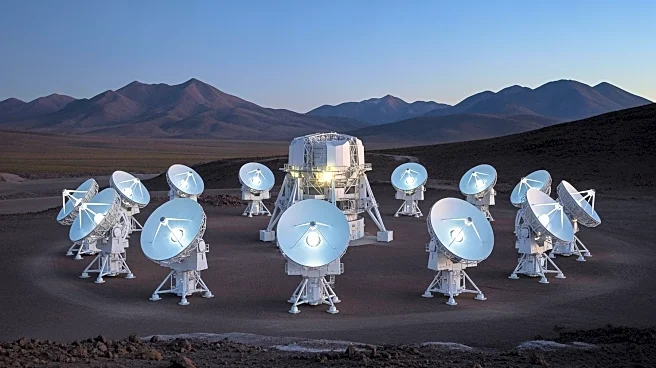What's Happening?
The Atacama Large Millimeter/submillimeter Array (ALMA), located in Chile's Atacama Desert, is a powerful astronomical observatory operated by the European Southern Observatory and its international partners.
Comprising 66 high-precision antennas, ALMA functions as a single, giant telescope that observes the universe in millimeter/submillimeter wavelengths. These wavelengths are crucial for studying regions where young stars are obscured by dust or distant galaxies whose light has stretched and cooled over time. The array is situated on the Chajnantor Plateau, at an altitude of 16,500 feet, providing an ideal environment for radio astronomy due to the thin, dry air that minimizes cosmic signal absorption.
Why It's Important?
ALMA's ability to observe in wavelengths invisible to the human eye allows astronomers to explore the universe's hidden corners, offering insights into star formation and the structure of distant galaxies. This research is vital for understanding cosmic evolution and the fundamental processes that govern the universe. The observatory's location in the Atacama Desert, one of the driest places on Earth, ensures minimal atmospheric interference, enhancing the precision of its observations. ALMA's findings contribute significantly to the field of astronomy, providing data that can lead to breakthroughs in our understanding of the cosmos.
What's Next?
As ALMA continues its operations, astronomers anticipate further discoveries that could reshape our understanding of the universe. The observatory's ongoing research may reveal new information about the formation of stars and galaxies, potentially influencing future astronomical theories and models. Collaborations with other international telescopes could expand the scope of ALMA's research, integrating its findings into broader scientific studies. The continued development and enhancement of ALMA's technology will likely improve its observational capabilities, allowing for even more detailed cosmic exploration.
Beyond the Headlines
ALMA's presence in Chile highlights the country's role as a hub for astronomical research, attracting scientists from around the world. The observatory's operations also underscore the importance of international collaboration in advancing scientific knowledge. Ethical considerations regarding the impact of such large-scale projects on local communities and environments are ongoing, with efforts to balance scientific advancement with cultural and ecological preservation.










